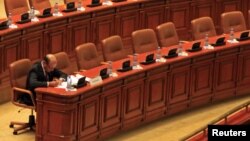Romania has been rocked by political turmoil after parliament suspended President Traian Basescu from office, paving the way for a referendum on his future later this month. The procedure comes despite European Union and U.S. concerns over the status of democracy in the former communist nation.
Basescu was suspended from his job Saturday after 256 legislators voted in favor of a procedure that could lead to him being permanently removed from office. Only 114 lawmakers were against the action.
Senate Speaker Crin Antonescu was appointed interim president.
Reacting to the vote, Basescu said he will now prepare for the July 29 referendum when Romanians will get a final say on his fate.
Basescu survived a similar vote in 2007. Analysts say he faces a tougher challenge this time, in part because of his declining popularity in a period of economic crisis in this nation of 19 million people.
Additionally, a recently adopted law requires only a simple majority of votes to push him out. Before, the requirements were more demanding.
Romania's ruling center-left coalition says Basescu should leave office because he overstepped his authority and interfered in the government's work since his re-election in 2009.
In one of the latest stand-offs, a public quarrel emerged between the president and Prime Minister Victor Ponta over who should represent the country at a European Union summit.
The Basescu has also been accused of alleged harsh remarks towards gypsies, also known as Roma, and disabled people, though the president has denied wrongdoing.
He told parliament before the suspension vote, the real reasons why the prime minister wants him to go is to increase his own power.
Unlike in some European nations, Romania's president is chosen by popular vote and is in charge of foreign policy, the powerful intelligence services and the country’s defense policies.
The latest moves have prompted the U.S. and the EU to express worries over Romania's democratic credentials.
The U.S. State Department said in a statement that it was concerned that developments in the country “threaten democratic checks and balances."
The EU's executive body, the European Commission, has also urged the government not to reduce the effectiveness of democratic principles and institutions, as the explained by commission spokesman Olivier Bailly.
"The rule of law, the democratic checks and balances and the independence of the judiciary are cornerstones of European democracy and indispensable for mutual trust within the European Union. Government policy and political action must respect these principles and values."
Bailly added that the latest developments threaten progress that was made in these areas since Romania joined the EU in 2007.
In addition to Basescu, Prime Minister Ponta has also come under opposition pressure to resign after an academic panel concluded that he copied a significant part of his doctoral thesis from other authors without proper attribution.
Ponta, who calls the charges politically motivated, says they have been orchestrated by an adviser to Basescu.
Basescu was suspended from his job Saturday after 256 legislators voted in favor of a procedure that could lead to him being permanently removed from office. Only 114 lawmakers were against the action.
Senate Speaker Crin Antonescu was appointed interim president.
Reacting to the vote, Basescu said he will now prepare for the July 29 referendum when Romanians will get a final say on his fate.
Basescu survived a similar vote in 2007. Analysts say he faces a tougher challenge this time, in part because of his declining popularity in a period of economic crisis in this nation of 19 million people.
Additionally, a recently adopted law requires only a simple majority of votes to push him out. Before, the requirements were more demanding.
Romania's ruling center-left coalition says Basescu should leave office because he overstepped his authority and interfered in the government's work since his re-election in 2009.
In one of the latest stand-offs, a public quarrel emerged between the president and Prime Minister Victor Ponta over who should represent the country at a European Union summit.
The Basescu has also been accused of alleged harsh remarks towards gypsies, also known as Roma, and disabled people, though the president has denied wrongdoing.
He told parliament before the suspension vote, the real reasons why the prime minister wants him to go is to increase his own power.
Unlike in some European nations, Romania's president is chosen by popular vote and is in charge of foreign policy, the powerful intelligence services and the country’s defense policies.
The latest moves have prompted the U.S. and the EU to express worries over Romania's democratic credentials.
The U.S. State Department said in a statement that it was concerned that developments in the country “threaten democratic checks and balances."
The EU's executive body, the European Commission, has also urged the government not to reduce the effectiveness of democratic principles and institutions, as the explained by commission spokesman Olivier Bailly.
"The rule of law, the democratic checks and balances and the independence of the judiciary are cornerstones of European democracy and indispensable for mutual trust within the European Union. Government policy and political action must respect these principles and values."
Bailly added that the latest developments threaten progress that was made in these areas since Romania joined the EU in 2007.
In addition to Basescu, Prime Minister Ponta has also come under opposition pressure to resign after an academic panel concluded that he copied a significant part of his doctoral thesis from other authors without proper attribution.
Ponta, who calls the charges politically motivated, says they have been orchestrated by an adviser to Basescu.




